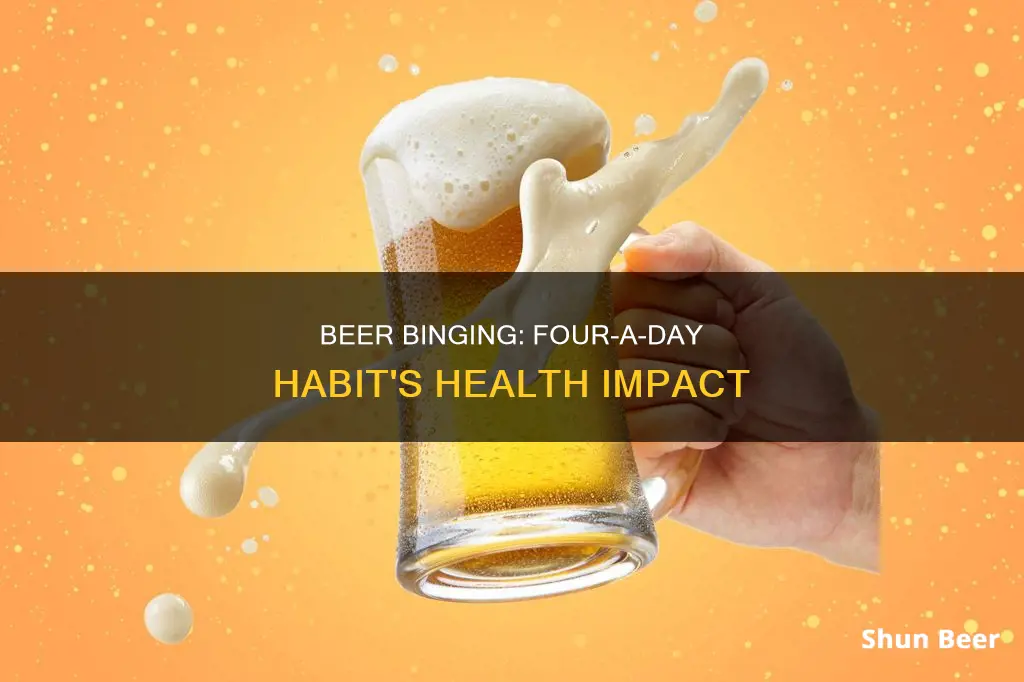
Drinking four beers a day is considered heavy drinking for women and is close to the threshold for men. Heavy drinking is associated with a higher likelihood of alcohol use disorder and other alcohol-related harms. Excessive drinking can lead to a range of negative health consequences, including unintentional injuries, violence, risky sexual behaviors, memory and learning problems, early dementia, inflammation, chronic diseases, gastrointestinal issues, malnourishment, a weakened immune system, obesity, and mental health issues such as depression and anxiety. It is important to note that alcohol is a drug, and while moderate drinking may have some benefits, current research suggests that even moderate drinking increases the risk of stroke, cancer, and premature death. Therefore, it is recommended that women have one drink or less per day, while men should limit themselves to two drinks or fewer per day.
| Characteristics | Values |
|---|---|
| Number of beers considered excessive drinking for men | 4 or more beers in 2 hours or 15 or more beers per week |
| Number of beers considered excessive drinking for women | 3 or more beers in 2 hours or 8 or more beers per week |
| Risk of health issues | Liver disease, heart disease, stroke, high blood pressure, cancer, ulcers, gastrointestinal issues, malnourishment, vitamin deficiency, weakened immune system, obesity, depression, anxiety |
| Risk of | Unintentional injuries, violence, risky sexual behaviours, memory and learning problems, early and permanent dementia |
| Social and professional risks | Decreased productivity at work, job loss, financial issues, problems with friends, family, and romantic relationships |
What You'll Learn

Increased risk of chronic diseases
Drinking four beers a day can increase your risk of developing chronic diseases. Excessive drinking is defined as drinking more than the recommended amount of alcohol, which is four drinks in one day for men and three drinks in one day for women. Binge drinking is defined as drinking five or more drinks within two hours for men and four or more drinks within two hours for women. Heavy drinking is defined as drinking eight or more drinks per week for women and 15 or more drinks per week for men. Drinking excessively can lead to an increased risk of developing chronic diseases such as cancer, cardiovascular disease, diabetes, and obesity.
Drinking four beers a day can increase your risk of developing cancer. According to the International Agency for Research on Cancer, ethanol in alcoholic beverages and acetaldehyde, a byproduct of alcohol consumption, are classified as "human carcinogens." Drinking alcohol has been identified as a risk factor for various cancers, including those of the upper aerodigestive tract (UADT), liver, colorectum, and female breast. Heavy drinkers have a higher risk of developing cancer compared to non-drinkers and occasional drinkers. The relative risk of developing oral and pharyngeal cancer for heavy drinkers is 5.13, while the risk of esophageal squamous cell carcinoma is 4.95, and the risk of laryngeal cancer is 2.65. Drinking alcohol can also increase the risk of developing breast cancer, with a relative risk of 1.61.
Drinking four beers a day can also increase your risk of developing cardiovascular diseases. Excessive drinking can lead to an increased risk of alcoholic cardiomyopathy (ACM), hypertension, stroke, and myocardial infarction (MI). While light to moderate drinking may have a protective effect on cardiovascular health, heavy drinking increases the risk of these conditions. Additionally, binge drinking can increase the risk of acute MI in the elderly within 24 hours of consumption.
Drinking four beers a day can also increase your risk of developing diabetes. There is a U-shaped association between alcohol consumption and diabetes risk. Drinking between 10 and 14 grams of alcohol per day can lower diabetes risk by 18%, while drinking more than 63 grams of alcohol per day can increase the risk. Beverage type analysis suggests that wine and beer provide the most protection against long-term incidences of diabetes. Moderate drinking may also be associated with reduced fasting insulin and HbA1c levels in non-diabetic individuals.
Drinking four beers a day can also increase your risk of developing obesity. Heavy drinking is positively associated with abdominal obesity, and beer consumption has been linked to increased abdominal adiposity. However, light to moderate drinking is inversely associated with obesity, especially in younger men. Drinking frequency also influences obesity risk, with a higher frequency of drinking associated with lower BMI and waist circumference for a given total alcohol consumption.
Vegans and Beer: What's the Verdict?
You may want to see also

Sleep disruption
Drinking four beers a day can have a detrimental effect on your sleep. Alcohol is a drug, and even a light amount of alcohol during the day can impair your sleep. A 2018 study published in JMIR Mental Health found that even light drinkers (defined as two or fewer servings for men, and one or fewer for women) experienced a 9.3% decrease in sleep quality.
When you consume alcohol, your liver metabolises it, which can result in a fitful night of sleep. Alcohol can affect your brain's communication pathway and its ability to process information. It can slow down your reflexes and impair your balance, memory, and sleep.
In addition, drinking four beers a day can be considered "heavy" or "at-risk" drinking, which can lead to health problems and alcohol use disorder. Binge drinking, which is defined as consuming enough alcohol to raise your blood alcohol concentration (BAC) to 0.08% or higher, is also a dangerous pattern of drinking that can lead to acute risks such as falls, memory blackouts, and car crashes, as well as chronic health problems.
Beer and Excedrin: Safe Mix or Not?
You may want to see also

Weight loss hindrance
Drinking four beers a day can hinder weight loss in several ways. Firstly, beer is high in calories, with a regular 12-ounce beer containing about 150 calories, and craft beers containing up to 350 calories per 12-ounce serving. These calories are often referred to as "empty calories", as they provide no nutritional value and can cause weight gain. Alcoholic drinks are often consumed in addition to one's regular daily calorie intake, and the high-calorie count can quickly add up, especially when mixed with sugary drinks or syrups.
Secondly, alcohol interferes with the body's fat-burning mechanisms. When consumed, alcohol is prioritised by the liver for metabolisation, taking precedence over other nutrients. This slows down the entire fat-burning process as the body focuses on processing the alcohol first.
Thirdly, drinking alcohol can lead to poor food choices and increased cravings. Alcohol relaxes inhibitions, making people more likely to overeat or opt for unhealthy foods. It impairs judgement, making it harder to stick to healthy eating plans.
Lastly, drinking large amounts of alcohol can reduce one's interest in exercise. It can also impair the body's ability to recover after a workout, further hindering weight loss efforts.
To summarise, drinking four beers a day can hinder weight loss by providing a significant amount of empty calories, disrupting the body's fat-burning processes, leading to poor food choices, and reducing motivation for physical activity.
Drinking Six Beers: Puking Probability?
You may want to see also

Digestive issues
Drinking four beers a day can have a range of adverse effects on your digestive system. Alcohol starts affecting your digestive system from the moment it enters your mouth. As the alcohol is first broken down in the stomach, there is an increase in digestive juices. This can cause abdominal pain, bloating, and diarrhoea.
Drinking four beers a day can also irritate the small intestine and colon, where alcohol is further broken down and absorbed. This can affect the normal speed at which food moves through the digestive tract, leading to potential discomfort and other issues.
Additionally, heavy alcohol consumption can negatively alter the bacteria in your gut, leading to intestinal inflammation and gut health issues. This alteration of gut bacteria can result in a condition known as "leaky gut syndrome," where the lining of the intestine becomes permeable. This condition further increases the body's susceptibility to alcohol-related diseases, including alcoholic fatty liver disease.
While some studies suggest that moderate drinking may have potential benefits, it is important to note that excessive alcohol consumption, including drinking four beers a day, can cause significant digestive issues and increase the risk of alcohol-related health problems.
Beer and Dieting: Is It Possible to Have Both?
You may want to see also

Higher cancer risk
Drinking four beers a day can significantly increase your risk of developing several types of cancer. Alcohol is a known human carcinogen, and the more alcohol you consume, the higher your risk of developing an alcohol-associated cancer.
Drinking four beers a day is considered "heavy" or "at-risk" drinking, and it puts you in a higher risk category for developing health problems. This amount of drinking can more than double your risk of oral cavity and pharynx (throat) cancers and increase your risk of larynx (voice box) cancers by 1.4 times. These risks are even higher if you also use tobacco.
Drinking 3.5 drinks a day, which is less than four 12-ounce beers, has been shown to double or even triple the risk of developing cancer of the mouth, pharynx, larynx, and oesophagus. This amount of drinking also increases your risk of colorectal cancer and breast cancer by 1.5 times.
In addition to these specific types of cancer, heavy alcohol consumption is associated with a higher risk of liver cancer and an increased risk of breast cancer. The risk of breast cancer increases with each additional drink consumed.
The link between alcohol and cancer is due to several factors. Firstly, when the body breaks down ethanol, it becomes acetaldehyde, a known carcinogen that damages DNA and prevents cells from repairing this damage, allowing cancerous cells to grow. Secondly, alcohol can affect hormone levels, such as increasing oestrogen levels, which can stimulate cell growth and division, providing more opportunities for cancer to develop. Thirdly, alcohol reduces the absorption of vital nutrients that protect the body from cancer, including vitamins A, B1, B6, C, D, E, K, and folate, as well as minerals like iron and selenium. Finally, alcohol contributes to weight gain, and excess weight is linked to over 12 types of cancer.
Understanding Beer Bikes: How Do They Work?
You may want to see also
Frequently asked questions
Yes, drinking 4 beers a day is considered "heavy" or "at-risk" drinking and can lead to serious health problems. This level of consumption exceeds the recommended daily intake limits for both men and women.
Drinking 4 beers a day can have both immediate and long-term effects on your health. It can cause digestive issues, dehydration, disrupted sleep, weight gain, and an increased risk of chronic diseases such as liver disease, heart disease, stroke, high blood pressure, and certain types of cancer.
Binge drinking is typically defined as consuming a larger amount of alcohol within a shorter period. For men, it is usually considered as having 5 or more drinks in about 2 hours, while for women, it is defined as 4 or more drinks within the same timeframe. Drinking 4 beers a day may not fall under the typical definition of binge drinking, but it still exceeds the recommended daily limits and is considered heavy drinking.
If you find yourself regularly drinking 4 or more beers in a day, it is a sign that your consumption has become excessive and may be causing harm to your health and well-being. It is important to be aware of the amount you are drinking and to seek help if you feel you are losing control over your drinking habits.
Some studies suggest that moderate beer consumption may have certain benefits, such as improved bone density, better gut health, and a reduced risk of heart disease and dementia. However, these potential benefits are often outweighed by the negative consequences of heavy drinking, and current research indicates that the less alcohol consumed, the better.







